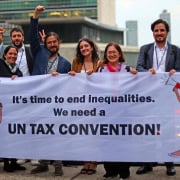|
Getting your Trinity Audio player ready...
|
By Mark Bou Mansour
First published on the Tax Justice Network
On 22 November countries at the UN adopted, by a landslide majority, a resolution to begin the process of establishing a framework convention on tax and completely change how global tax rules are decided. The framework convention can eventually move decision-making on global tax rules from the OECD – a small club of rich countries where this has sat for over 60 years – to the UN.
“This is a historic victory delivered by countries of the global South, for the benefit of people all around the world. Tax havens and corporate lobbyists have had too much influence on global tax policy at the OECD for too long. Today, we start to take back power over global tax rules that affect all of us,” said Alex Cobham, chief executive at the Tax Justice Network.
The result of today’s UN vote has for decades been considered impossible to achieve. The last attempt to bring decision-making on tax rules to the UN was in the 1970s. The failure of the attempt dissuaded any similar attempts for nearly 50 years.
The past year, and these last few weeks before the vote especially, saw strong opposition to the resolution from the OECD and from OECD members the US, UK, and EU as well. The UK and EU in particular drew criticism in recent weeks from negotiators at the UN for attempting to “kill” the UN process and for negotiating in “bad faith”. The success of the resolution despite the resistance from the world’s strongest economies is a rare feat and demonstrates the overwhelming demand from countries outside the OECD for the meaningful voice on global tax rules which they have historically been denied.
A last-minute attempt by the UK to defang the UN resolution, by removing any mention of a convention from the resolution, was defeated by nearly 2 to 1: 107 countries rejected the resolution; 55 countries supported it.
The unamended resolution was supported by an even bigger margin. Nearly two-thirds (125) of countries at the UN voted in favour of the reforms. 48 countries voted against the resolution and nine abstained. The US, UK, and all EU member countries voted against the resolution.
The adoption of the resolution is being widely celebrated by government officials, economists, and civil society organisations around the world.
The African Union published a statement shortly after the vote, saying:
“For developing nations, this resolution represents a beacon of hope. It will facilitate the access of much needed financial resources, crucial for responding to the current debt crises and facilitate the pursuit of achieving sustainable development.”
The decades’ long fight of global South countries to establish a fully inclusive process at the UN to participate in agenda setting and norm setting on international tax is now a reality, said the organisation.
“We look forward to building on this spirit of co-operation and agreeing on an effective UN Framework Convention on International Tax Co-operation to urgently mobilise resources for our development.”
Cobham said: “The great majority of countries have declared today that they are ready to move on from the OECD and will start negotiating global tax rules at the UN instead. We invite all countries to join in these negotiations and begin a new chapter of economic prosperity for people everywhere.”








